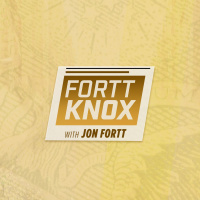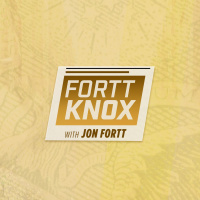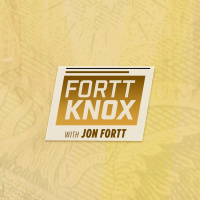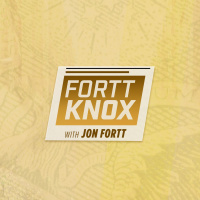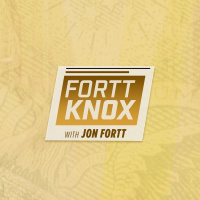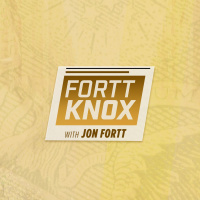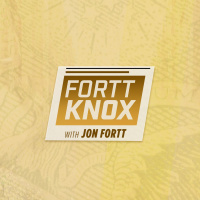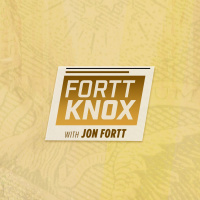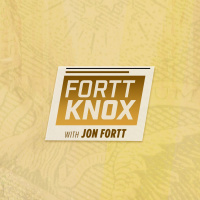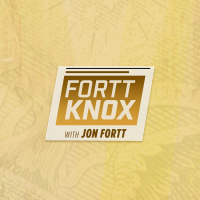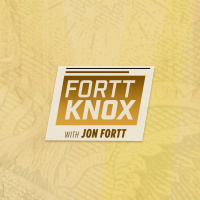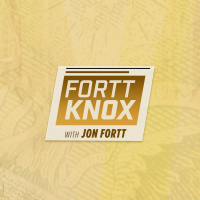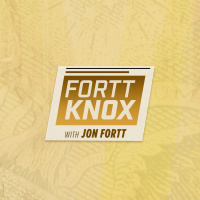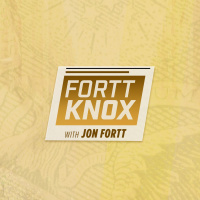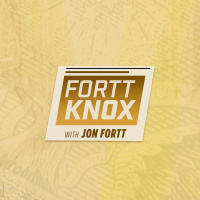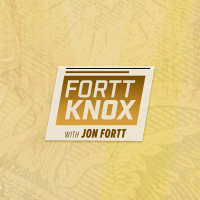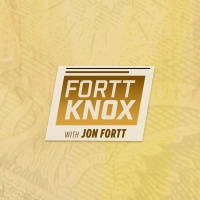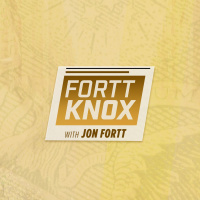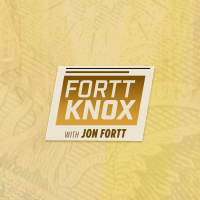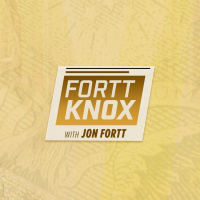Informações:
Sinopsis
Jon Fortt co-anchors Squawk Alley on CNBC, and has covered technology and innovation for more than 15 years. Fortt Knox brings you rich ideas and powerful people. Guests include Intel CEO Brian Krzanich, Accenture CEO of North America Julie Sweet, Olympic champion Michael Phelps, and Broadway veteran Rory O'Malley (Hamilton, The Book of Mormon). Join Jon's conversations with power brokers on how they made it, what they value, and what makes them tick.
Episodios
-
127 - Life Lessons and an Elephant Attack: Great Stories from Great Minds
23/06/2019 Duración: 26minJulie Sweet today leads the North American business at Accenture, a global consulting giant. Years ago, she was a high school sophomore with the gift of gab, entering various debate and speech competitions for the prize money, building her own scholarship fund. She wasn't doing it for kicks; at times growing up in Southern California she had just one pair of shoes, or one pair of pants that fit. Her father painted cars for a living, and her mother was a hairdresser. One particular contest at the Lions Club had come down to a final showdown between Julie and another girl. Julie lost. Stung by the injustice of it – she felt her speech had been better – she griped to her father on the way home. — To say Tom Siebel has had an interesting life would be putting it mildly. He’s a billionaire entrepreneur, a tech visionary, and the survivor of an elephant attack eight years ago that, by the odds, should have killed him. Several doctors told him he would never walk again, much less sail competitively. But he
-
126 - Jeff Wilke, Amazon CEO of Global Consumer, Exclusive from re:MARS
08/06/2019 Duración: 22minAmazon has three people who hold the title of CEO. There's Jeff Bezos, the founder and CEO. Then there are two deputies: Andy Jassy, the CEO of Amazon Web Services, the cloud business. And Jeff Wilke, CEO of global consumer. Jeff Wilke got the title CEO of global consumer three years ago, and hadn't done a broadcast interview since – until this week, when he sat down with me for CNBC. Wilke's been with Amazon for 20 years, and now runs the core business of e-commerce and physical retail. The massive global logistics operation, the billions of items shipped – all that reports up to him. I talked to Jeff Wilke in Las Vegas at Amazon's first re:MARS event; MARS stands for machine learning, automation, robotics and space. Later on in his keynote, Wilke gave an update on Amazon's plan to deliver packages by drone. He didn't spill the beans on that plan in this interview, but he does talk about Amazon's ambition to keep delivering Prime packages faster and faster – in even less than a day.
-
125 - Apple WWDC Preview, and Tech's Labor Unrest; with Walt Mossberg
02/06/2019 Duración: 29minWe’re past Memorial Day, and that means two things: barbecue season, and software season. Apple’s Worldwide Developer Conference, WWDC, kicks off Monday. It’s an event where Apple gathers engineers from everywhere to announce its vision for the future of software, and to answer their questions about how to make today’s apps work better. Who cares? Well, if you use an iPhone, iPad, Mac, you’re probably getting new software, even if you don’t buy a new device. And if you’re a tech watcher, you get some hints about what’s coming in the next generations of iPhones and iPads. Joining me to talk Apple, tech labor and more, I’ve got the father of tech reviews, a pioneer in tech journalism, Walt Mossberg.
-
124 - Huawei, T-Mobile, and Winning at All Costs
26/05/2019 Duración: 29minEver get so mad in an argument that you forget what it’s about? Just so focused on the other person being wrong that you forget what your point was in the first place? A couple of developments in tech this week bring exactly that to mind. The Trump Administration’s blacklisting of Huawei and the outcry over FCC Chairman Ajit Pai’s blessing for the marriage of T-Mobile and Sprint. Huawei is China’s biggest tech player, kind of like what Samsung is in South Korea. Huawei makes phones, they make networking equipment. The Trump Administration says they also make a security risk for U.S. 5G networks. Huawei’s leadership is too close to the Chinese government, they say, and so no U.S. companies should buy their equipment or otherwise do business with them. I say that’s a flawed security strategy and we’re going to talk about why. Joining me to do exactly that: Kevin Delaney, Editor in Chief at Quartz.
-
123 - Is SoftBank Spoiling Silicon Valley?
18/05/2019 Duración: 26minYou ever hear about kids taking a gap year after high school? A gap year. It's when they don't go straight to college and don't get a job, they … do something else. Maybe travel to Europe, or hike the Appalachian Trail. Gap years cost money, so mostly rich kids do them. For other people they’re called “being unemployed,” or “vagrancy.” But! For kids whose parents can afford it? A gap year can be a beautiful period of self-discovery. Or it can be a ticket to delay responsibility. What does this have to do with tech? Uber just went public days ago, after waiting a long time. Which is kind of like finally starting college after that gap year. How did the stock do? Terrible. Like straight Fs. Priced at the low end of the range, trading 10 percent below that. I blame the parents. SoftBank and its 100-billion-dollar Vision Fund have been slinging billions of dollars around Silicon Valley like gap years after Andover, helping startups delay their IPOs. The question today? Is SoftBank spoiling the kids?
-
122 - The Uber IPO Show; Plus, Amnon Shashua on Intel's Driverless Challenge
11/05/2019 Duración: 55minUber had an action-packed IPO that did NOT go the way a lot of people expected. And in the lead-up to that, I got a visit from one of the smartest guys in the world in the field of computer vision – which is an important facet of driverless cars. This week on Fortt Knox, Ina Fried of Axios joins me to talk Uber, and Amnon Shashua of Mobileye tells how he went from college professor to billionaire entrepreneur … who is still a college professor.
-
121 - The Endgame in Streaming for Disney; Plus, VMware CEO Pat Gelsinger
06/05/2019 Duración: 50minIs Endgame just the beginning? Disney has its eyes on the prize in the streaming wars, and now that it’s clocked the biggest movie opening ever – by a mile – all the pieces might be falling into place. I now consider myself to be something of an Avengers Endgame expert. I saw it in Orlando on vacation Friday, then got stranded in Vegas for work Monday and saw it again. Don’t ask. And basically Disney couldn’t ask for a better setup for the launch of its streaming strategy this fall. This year it’s closing out two of the top-grossing movie franchises of all time: Avengers and the Star Wars Skywalker saga. This as some of the biggest names in tech, including Apple, Google and Amazon, are also suiting up to do battle in streaming. Also: I sat down with VMware CEO Pat Gelsinger to talk about innovation, tech's impact on society, and the challenges of being a person of faith while leading a Silicon Valley company.
-
120 - Apple's Qualcomm Truce, IPO Fever; with The Verge's Casey Newton
22/04/2019 Duración: 22minI grew up in Washington, DC in the ‘80s. And 4 out of 5 playground fights ended before they started. Oh, there was plenty of trash talk – name calling, threats, even pushing. But when it was time to throw down? Most kids didn’t really want that busted lip. This week we saw that same story play out in the multi-billion-dollar world of tech. Apple was gonna teach Qualcomm a lesson. Qualcomm wasn’t scared. Yesterday, minutes into their high-stakes court battle, the giants settled. With me to break down the most important stuff happening in tech: Casey Newton of The Verge.
-
119 - Winning in the Markets and on the Court: John Rogers, Jr., Ariel Investments founder & CEO
13/04/2019 Duración: 28minJohn Rogers, Jr. Is Chairman and CEO of Ariel Investments. It has $13 billion under management. It's the largest black-owned investment firm in the country, and he's been running it more than 35 years. This week, my conversation with John. We talk about a lot of stuff, including why he likes to eat one meal a day at McDonald’s, and how he once beat Michael Jordan playing basketball, 1-on-1. Seriously. It’s on YouTube.
-
118 - IBM CEO Ginni Rometty on A.I. and the Future of Work
06/04/2019 Duración: 14minThis week I spent some time talking to Ginni Rometty, the chairman and CEO of IBM. I've been wanting to do a CNBC and Fortt Knox interview with Ginni for years now, and this year, it finally all came together. As a matter of fact, she and I have been making up for lost time. She's been kind enough to sit down with me three times: in January after her keynote at the Consumer Electronics Show in Las Vegas, in February at IBM's Think conference in San Francisco, and this week at CNBC's first Future of Work event of the year in New York. We've got a rhythm going. After our on-stage interview tackling artificial intelligence, workforce training and more, she joined me for a dive into how IBM is addressing those challenges specifically, and how the themes of technology shifts, equity and discomfort fit her own journey. This is a quick talk by Fortt Knox standards – but it's packed. Ginni doesn't waste words. Still, she left me wanting more, and I'll wager you'll feel the same. I can guarantee I'll try to get h
-
117 - Apple's New Services: Will They Work? Kevin Delaney, Stephanie Mehta, Rebekah Saltsman
30/03/2019 Duración: 29minApple TV Plus. Apple News Plus. Apple Arcade. Apple Card. We still don’t have all the details, like pricing and mechanics, but Apple CEO Tim Cook hosted Hollywood royalty at the company’s Cupertino headquarters this week. The promise: a new model for digital commerce and digital content that emphasizes privacy over targeting and subscriptions over ads. But is Apple too late? And for publishers and producers who have been burned by the big platforms before, is this time different? Joining me to dig for answers, Kevin Delaney, editor-in-chief and co-CEO at Quartz; Stephanie Mehta, editor of Fast Company; and Rebekah Saltsman, CEO of Finji, the game studio behind Overland.
-
116 - Beyond the College Cheating Scandal: Plus, Frank Calderoni, Anaplan CEO
23/03/2019 Duración: 53minTwenty-five years ago today I was probably really stressed out about the college application and admissions process. Things have arguably gotten tougher since then for students trying to chart their futures. And the headlines this month don’t help. The U.S. Department of Justice charged 50 people last week in a multi-million-dollar scheme that allowed rich parents to cheat the college admissions system. By faking standardized test scores and bribing athletics officials, those parents managed to get their kids into elite schools like Georgetown, Stanford, Yale, and USC. But what if you don’t want to commit a crime but still want to succeed in life? What’s the plan? We’re going to discuss. With me this week: Michael Reilly, executive director of the American Association of Collegiate Registrars and Admissions Officers; C.J. Farley, author of the new book Around Harvard Square, and the father of two teenagers; Adam Brownlee, an investment theory instructor at Western Kentucky University who has done the
-
115 - Should Big Tech Break Up? Plus, Playwright Dominique Morisseau
16/03/2019 Duración: 41minHave tech companies gotten so big that it’s bad for the economy? Senator Elizabeth Warren says so. She’s proposing to break up not one, but several tech giants, including Amazon, Apple, Facebook and Google. She says they shouldn’t be allowed to both run distributor platforms and compete on them. It’s like being an umpire and a team owner at the same time. Spotify co-founder and CEO Daniel Ek not calling for a breakup, but he is calling for an overhaul – specifically when it comes to Apple. He’s pointing to the same issue Warren is: Apple is charging Spotify to operate on its App Store, but then also competing with Spotify in the same store. So. Is there a problem here? Should big tech be broken up? If not, should regulators step in to change the rules? This week I’m joined by Wired senior writer Lauren Goode; and here with me, New York Times Tech columnist Kevin Roose. Joining us in just a bit, former FCC Chairman Tom Wheeler, Author of new book: “From Gutenberg to Google: The History of Our Future” L
-
114 - Fortnite vs. Apex Legends, Plus Ciena CEO Gary Smith
09/03/2019 Duración: 57minYou’ve probably heard of Fortnite. It’s a game and more than a game – a cultural moment that’s swept in with all the force of Pokémon Go, and arguably more of the staying power. There’s the game itself, but there are the dances, the addictions. Now, here’s a twist: Fortnite has competition. Electronic Arts a month ago dropped Apex Legends, its own free-to-play multiplayer team combat game, and it MIGHT be hotter than Fortnite. It has grown as much in a month as Fortnite did in four. Fortnite’s developer is already copying features. So. What makes this style of game so different from what came before? How big is the money involved? And how does it fit into the future of eSports? Plus: Gary Smith grew up in Birmingham, then the industrial heart of the United Kingdom. Both of his parents worked in factories. For career day, the high school took the kids to a coal mine and a steelworks. Smith wasn't inspired. Smith is now the CEO of Ciena, a networking company with a market value over $6 billion. But at the
-
113 - Opening Tech: The Diversity Challenge. With Anu Duggal, Female Founders Fund; Kathryn Finney, Digital Undivided; Ruben Harris, Career Karma
02/03/2019 Duración: 26minThere’s little question that technology – software – is shaping the future of our work, our play, and even how we form opinions. But who is shaping that technology? It’s been quite an economic run. The stock market’s been climbing for a decade, and in that time, tech companies like Apple, Google, Amazon and Facebook have gone from underdogs to overlords. Even as that’s happened, employees and observers have settled on a nagging question: Is there room for more women and minorities on the campuses and in the startups where this future is crafted? With me in New York this week, Anu Duggal, founding partner at Female Founders Fund. Joining me from Atlanta, Kathryn Finney, founder and managing director at Digital Undivided, which encourages entrepreneurship among black and Latina women. And from San Francisco, Ruben Harris is CEO of Career Karma, host of the Breaking Into Startups podcast.
-
112 - Amazon Leaves NYC: Good or Bad? With Anand Giridharadas and Robert Frank
16/02/2019 Duración: 30minSo long, New York! Amazon has pulled out of its commitment to build a massive campus and bring 25,000 to 40,000 high-paying jobs to Long Island City in Queens. On Valentines Day! Roses are red / violets are blue / you’re not getting / my HQ2 – Love, Jeff What went wrong? Why the breakup? First of all, some critics were mad that New York offered 3 billion dollars in tax incentives to lure Amazon in the first place. Most businesses just come here because they want to be in New York and pay the taxes. Second, you’ve got the union issues. Amazon flat out said, we’re not going to want our employees to unionize. But still. It wasn’t as if the working class in Queens was rising up in protest against the Amazon deal. A poll by the Siena College Research Institute found 56 percent of New Yorkers wanted it, Democrats and Independents more than Republicans. Blacks and Latinos favored the deal more than any other group. So what gives? And what does it mean for future deals between billionaire-run corporations an
-
111 - Is Facebook Really That Bad? Roger McNamee and Antonio Garcia Martinez
09/02/2019 Duración: 29minFacebook is worth almost a half trillion dollars. It has more than 2 billion users who log in at least once a month. It has a famous CEO, Mark Zuckerberg, hailed in Silicon Valley as a Bill Gates for the Internet age – the suburban Harvard kid who dropped out of Harvard to start a company and change the world. Facebook also has problems. Its once non-controversial mission of connecting the world has taken a dark turn. Connecting the world to what, exactly? After the Cambridge Analytica scandal, and controversies over how Facebook gave partners access to user data, there’s a question hanging out there. Is Facebook unwittingly connecting the world to too much misinformation, political manipulation, or worse? Or does the good that happens on Facebook outweigh the bad? With me this week: Roger McNamee. He’s an early investor in Facebook. He’s an early adviser to Mark Zuckerberg. Facebook has made him a lot of money. And he’s the author of a new book out this week: “Zucked: Waking Up to the Facebook Catastrophe
-
110 - #Nevertweet: Time to Cut Back on Social? Farhad Manjoo, Jeff Jarvis, Chris Moody, Jaron Lanier
02/02/2019 Duración: 31minApple this week pulled a Facebook app from the App Store. It’s called Facebook Research, and its purpose was to let Facebook watch everything that users did on the phone. Apple says the snooping app is too invasive, even if users had consented to letting Facebook watch their every move. Which raises the question: How much social media is too much? Are we giving these platforms too much data? Are we posting stuff too quickly without thinking about it? Is it time to step back? With me this week, Farhad Manjoo, a New York Times columnist who recently wrote a column about the response to the controversy around Covington Catholic students, and how that inspired him to change his Twitter behavior. Also with me, Jeff Jarvis, professor at the City University of New York and longtime journalism commentator. Chris Moody is a former data strategy VP at Twitter, currently a partner at investment firm Foundry Group. And later, Jaron Lanier, noted computer scientist, and researcher at Microsoft.
-
109 - Fender CEO Andy Mooney; Plus, in the Netflix Era, What Makes a Show Valuable?
26/01/2019 Duración: 56minHe did this the hard way – grew up playing guitar in a band, skipped college, became an accountant by testing into the profession and, after he got into the corporate world, made a lateral move into marketing. He is Andy Mooney, the CEO of Fender Musical Instruments Corporation. Mooney and Fender are trying to change the way we look at musical instruments, and the process of buying one and learning to play. It all made sense after he told me his role in the Disney Princess concept becoming a global marketing phenomenon. Also: The game has changed. It used to be, a movie was valuable if it had a big showing at the box office, though there was the occasional film that did big rental business but didn’t do much in theaters. For more on that, see the entire careers of Mary Kate and Ashley Olsen after Full House. And then for TV, much of the same: A show is big if it gets people to watch commercials or buy cable.
-
108 - Behance Founder Scott Belsky; Plus, Walter Isaacson and Jim Stewart on the Future of Journalism
21/01/2019 Duración: 01h32sScott Belsky didn’t drop out of college, didn’t go straight into being an entrepreneur – he had an idea about what a certain group of customers needed, and he kept tweaking his approach until he built the right thing. That thing, Behance, is a professional network for artists. Kind of like a LinkedIn for visual people. He sold it to Adobe for $150 million. That in itself is pretty cool. But maybe more impressive is what he’s done since. He helped kickstart Adobe’s move to software at a service and invested early in a bunch of hot startups like Uber, Pinterest, Warby Parker and Sweetgreen. Now he’s back at Adobe, leading the development of creative cloud products. Scott Belsky is the author of The Messy Middle, a book about the challenges between starting something and declaring it a big success. I loved this conversation. Here’s Scott Belsky.

